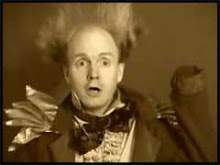I watched Dog Day Afternoon last week for the first time in many years and had forgotten how much slapstick comedy underlies its 70s style realism. The theme of squished expectations structures this movie, many clown acts, and quite a few silent comedies. It starts when a character or characters have a great idea, "I know, I'll do a juggling act," but have their faces rubbed into the fact, "I'm not a very good juggler." It happens in life quite a bit, too (at least in my life, which is one explanation why I am a professional fool).
In Dog Day Afternoon, the characters have images of successful crimes pulled off in movies and their own fantasies that contrast with the situations that follow (in the real life event that this story is based upon, the bank robbers watched The Godfather for inspiration before going to the bank). Sonny (Al Pacino) has probably mentally rehearsed the action of dramatically opening a box of flowers and quickly/coolly whipping out a gun to strike fear in the hearts of the bank employees. Instead his status is lowered as flower boxes aren't easy to open, especially when you are nervous and haven't physically practiced.
Dog Day Afternoon Trailer
The indifferent world outside ourselves is not as controllable as our imaginations.
There are many such moments throughout the film and also a number of unplanned successes. Plus, Al Pacino has a Buster Keaton vibe to his performance, especially in the expressiveness of his eyes. The ending, though, makes you forget there was comedy earlier.
Exercise:
Imagine yourself doing something perfectly, with style, finesse, and mastery. This could be realizing a childhood dream (performing a dramatic illusion show like David Copperfield), solving a problem (getting this room cleaned in an hour), or even achieving something simple act (brushing your teeth).
Now confidently enact what you imagined, and be aware when the world does not cooperate. You can even seek out potential stumbling blocks. At the very least write a scenario where everything you planned goes wrong. How could a solution to your problem or the center of a piece be found in the intersections of expectations and existence? What examples from your own life match this pattern? Can you laugh at them in retrospect?
Footnote: Interestingly, my childhood friend Matt wrote a more personal blog entry on the same subject at the same time I was writing this entry.
Subscribe to:
Post Comments (Atom)




No comments:
Post a Comment